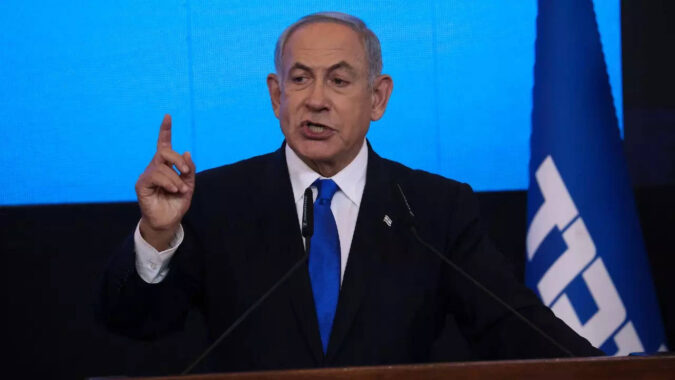WASHINGTON: Israeli prime minister Benjamin Netanyahu said Wednesday he was considering military aid to Ukraine and was willing to serve as a mediator, following US calls for more active involvement.
Netanyahu made no firm commitments to Ukraine and Israel has preserved a relationship with Russia, which controls the skies in neighboring Syria and has turned a blind eye to Israeli strikes on targets of arch-nemesis Iran.
Netanyahu was asked in an interview with CNN if Israel could provide assistance to Ukraine such as Iron Dome, the US-backed technology that defends Israel from air attack.
“Well, I’m certainly looking into it,” Netanyahu said.
He confirmed that the United States has shifted a little-known stockpile of artillery it stations in Israel to Ukraine and he cast the Jewish state’s own operations against Iran as part of a similar effort.
“The US just took a huge chunk of Israel’s munitions and passed it on to Ukraine. Israel also, frankly, acts in ways that I will not itemize here against Iran’s weapons productions which are used against Ukraine,” he said.
Ukrainian and Western officials say Iran has sold low-cost drones to Russia for its invasion of Ukraine, although Tehran denies that.
Netanyahu said he was asked to mediate in an unofficial role after Russia invaded Ukraine in February but did not pursue it as he was then in opposition.
He said he was willing to mediate if asked by the parties and the United States.
“I’ve been around long enough to know that there has to be a right time and the right circumstances. If they arise, I’ll certainly consider it,” he said.
The remarks come after a visit by US secretary of state Antony Blinken, who called for calm following a flare-up of violence between Israel and the Palestinians and also nudged Israel to boost support to Ukraine.
Using language familiar to Israelis, Blinken said Ukraine needs assistance “as it bravely defends its people and its very right to exist.”
Israeli foreign minister Eli Cohen told Blinken that he would travel to Ukraine to reopen his country’s embassy, the first such trip since the war.
Netanyahu’s predecessor Naftali Bennett paid a surprise visit to Moscow in March to mediate with Putin.
Bennett passed along Putin’s messages to Ukrainian President Volodymyr Zelenskyy but did not succeed in arranging direct negotiations.
Netanyahu made no firm commitments to Ukraine and Israel has preserved a relationship with Russia, which controls the skies in neighboring Syria and has turned a blind eye to Israeli strikes on targets of arch-nemesis Iran.
Netanyahu was asked in an interview with CNN if Israel could provide assistance to Ukraine such as Iron Dome, the US-backed technology that defends Israel from air attack.
“Well, I’m certainly looking into it,” Netanyahu said.
He confirmed that the United States has shifted a little-known stockpile of artillery it stations in Israel to Ukraine and he cast the Jewish state’s own operations against Iran as part of a similar effort.
“The US just took a huge chunk of Israel’s munitions and passed it on to Ukraine. Israel also, frankly, acts in ways that I will not itemize here against Iran’s weapons productions which are used against Ukraine,” he said.
Ukrainian and Western officials say Iran has sold low-cost drones to Russia for its invasion of Ukraine, although Tehran denies that.
Netanyahu said he was asked to mediate in an unofficial role after Russia invaded Ukraine in February but did not pursue it as he was then in opposition.
He said he was willing to mediate if asked by the parties and the United States.
“I’ve been around long enough to know that there has to be a right time and the right circumstances. If they arise, I’ll certainly consider it,” he said.
The remarks come after a visit by US secretary of state Antony Blinken, who called for calm following a flare-up of violence between Israel and the Palestinians and also nudged Israel to boost support to Ukraine.
Using language familiar to Israelis, Blinken said Ukraine needs assistance “as it bravely defends its people and its very right to exist.”
Israeli foreign minister Eli Cohen told Blinken that he would travel to Ukraine to reopen his country’s embassy, the first such trip since the war.
Netanyahu’s predecessor Naftali Bennett paid a surprise visit to Moscow in March to mediate with Putin.
Bennett passed along Putin’s messages to Ukrainian President Volodymyr Zelenskyy but did not succeed in arranging direct negotiations.
